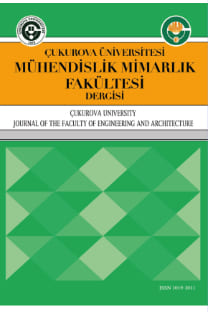Irreversibility Analysis of a Minibus Air-Conditioner for Different Condensation Pressures
Farklı Yoğuşma Basınçları için Minibüs Klimasının Tersinmezlik Analizi
___
Bilgili, M., Çardak, E., Aktaş, A.E., 2017. Thermodynamic Analysis of Bus Air Conditioner Working with Refrigerant R600a, European Mechanical Science, 1(2), 69-75.Simsek, E., Karacayli, I., Ilin, S. C., Bilgili, M., 2018. Minibüs Kliması Eğitim Setinin Tasarlanması ve Kurulması, 2 nd International Vocational Science Symposium, 420-427, Antalya.
Yu, B.F., Hu, Z.B., Liu, M., Yang, H.L., Kong, Q.X., Liu, Y.H., 2009. Review of Research on Air-Conditioning Systems and Indoor Air Quality Control for Human Health, International Journal of Refrigeration, 32, 3–20.
Gungor, A., Karacayli, I., Simsek, E., Canli, Y., 2017. Geri Dönüş Havalı İklimlendirme Sistemlerinde Enerji ve Ekserji Analizi, Çukurova Üniversitesi Mühendislik Mimarlık Fakültesi Dergisi, 32(3), 19-29.
Dincer, I., Rosen, M.A., 2007. Exergy, Energy, Environment and Sustainable Development, 1 st ed., Elsevier, Oxford, UK.
Liang, H., Kuehn, T.H., 1991. Irreversibility Analysis of a Water to Water Mechanical Compression Heat Pump, Energy, 16(6), 883-896.
Sahin, R., Ata, S., Kahraman, A., 2018. Organik Rankine Çevriminde Farklı Tip Akışkanlarda Türbin Giriş Sıcaklığı ve Basıncının Sistem Bileşenlerindeki Tersinmezlik Değerlerine Etkisinin Belirlenmesi, Çukurova Üniversitesi Mühendislik Mimarlık Fakültesi Dergisi, 33(2), 225-236.
Yataganbaba, A., Kilicarslan, A., Kurtbas, I., 2015. Irreversibility Analysis of a Two- Evaporator Vapour Compression Refrigeration System, Int. J. Exergy, 18(3), 340–355.
Tosun, E., Bilgili, M., Tuccar, G., Yasar, A., Aydın, K., 2016. Exergy Analysis of an Inter- City Bus Air-Conditioning System, Int. J. Exergy, 20(4), 445–464.
Hepbasli, A., Akdemir, O., 2004. Energy and Exergy Analysis of a Ground Source (Geothermal) Heat Pump System, Energy Conversion and Management, 45(5), 737-753.
Cengel, Y.A., Boles, M.A., 2015. An Engineering Approach, New York: McGraw- Hill Education.
Hepbasli, A, 2008. A Key Review on Exergetic Analysis and Assessment of Renewable Energy Resources for a Sustainable Future, Renewable and Sustainable Energy Reviews, 12(3), 593-661.
Salazar-Pereyra, M., Toledo-Velázquez, M., Eslava, G.T., Lugo-Leyte, R., Rosas, C.R., 2011. Energy and Exergy Analysis of Moist Air for Application in Power Plants, Energy and Power Engineering, 3, 376-381.
Türkakar, G., Okutucu-Özyurt, T., 2015. Entropy Generation Analysis and Dimensional Optimization of an Evaporator for Use in a Microscale Refrigeration Cycle, International Journal of Refrigeration, 56, 140-153.
Kotas, T.J., 1985. The Exergy Method of Thermal Plant Analysis, Anchor Brendon Ltd.
Qureshi, B.A., Zubair, S.M., 2003. Application of Exergy Analysis to Various Psychrometric Processes, International Journal of Energy Research, 27, 1079-1094.
- ISSN: 1019-1011
- Yayın Aralığı: 4
- Başlangıç: 1986
- Yayıncı: ÇUKUROVA ÜNİVERSİTESİ MÜHENDİSLİK FAKÜLTESİ
METİN DAĞTEKİN, ALİ AYBEK, M. Emin Bilgili
Kelime Temsil Yöntemleri ile Kelime Benzerliklerinin İncelenmesi
Irreversibility Analysis of a Minibus Air-Conditioner for Different Condensation Pressures
İBRAHİM KARAÇAYLI, ERDOĞAN ŞİMŞEK
AISI 1020 Çeliğinin Gerilebilirlik ve Eğilebilirlik Özelliklerinin Deneysel Olarak İncelenmesi
Funda KAHRAMAN, Mehmet KÜÇÜK, Mustafa Kemal KÜLEKCİ
ÖZER ÖREN, ŞAHİN YUVKA, CEM ŞENSÖĞÜT, İ. Göktay EDİZ
Yüzey Pürüzlülüğü Ölçme İşleminde Ölçme Belirsizliği Hesapları ve Belirsizlik Bütçesi Tablosu
ANIL AKDOĞAN, ALi Serdar VANLI
Döner Fırına Etki Eden Yüklerin Analizi ve Hidrolik Dizayn
